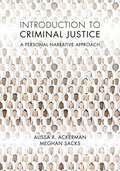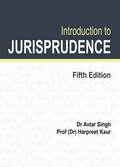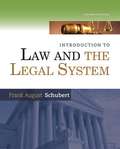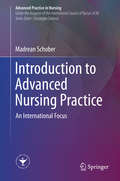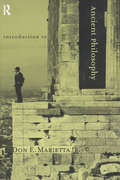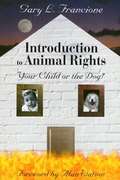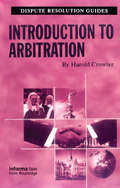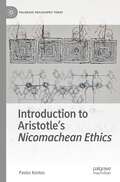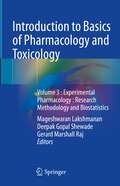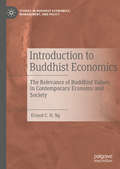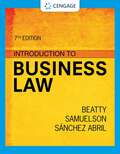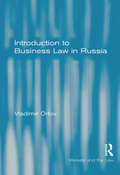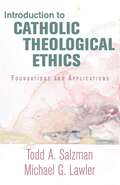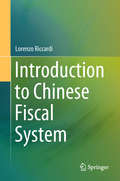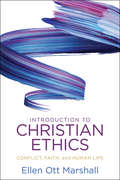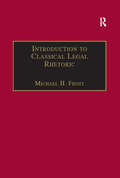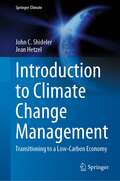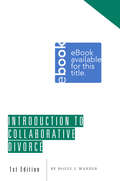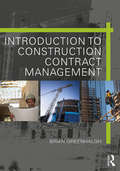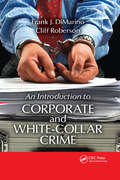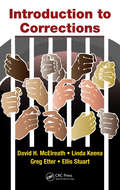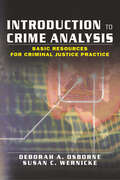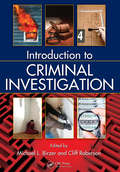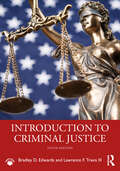- Table View
- List View
Introduction To Criminal Justice: A Personal Narrative Approach
by Alissa Ackerman Meghan SacksThis book offers a new kind of introduction to criminal justice―a lively, evocative text built around and enlivened by the lived experiences of those who, by choice or not, are heavily involved in the criminal justice system. The authors have included over 30 narratives from victims, offenders, and professionals working within the system. These personal narratives provide real-life examples of how crime and the criminal justice system are experienced. The experiences of real people are often lost in discussions about criminal justice processes and the criminal justice system in general. Texts and teaching too frequently focus exclusively on criminal justice procedures or on macro-level systems. Such conversations lose sight of and de-value the impact of systems on individuals. This textbook seeks to provide the human voice to the topic of criminal justice, while also providing all of the relevant materials to introductory classes. Built around the narratives are all of the traditional materials that instructors need to cover in introduction to criminal justice courses. However, since a good portion of the text will be powerful narratives written by those who have "lived" and "performed" in the criminal justice domain, this book represents an innovative approach that simultaneously challenges instructors to think about their pedagogy in new ways, potentially making their classroom encounters more lively and compelling.
Introduction To Jurisprudence
by Dr Avtar Singh Dr Harpeet Kaur"Introduction to Jurisprudence" by Dr. Avtar Singh and Dr. Harpeet Kaur provides a comprehensive exploration of the fundamental concepts and theories that underpin the field of jurisprudence. The book delves into the nature of law, examining its historical evolution and the diverse philosophical perspectives that have shaped legal thought. It navigates through key jurisprudential themes such as justice, rights, and the relationship between law and morality. The authors offer a nuanced understanding of legal theories, including positivism, natural law, legal realism, and feminist jurisprudence. With clarity and depth, the book engages readers in critical reflection on the nature of law and its impact on society. It serves as an invaluable resource for students, scholars, and practitioners seeking a robust foundation in jurisprudential studies.
Introduction To Law And The Legal System
by Frank August SchubertINTRODUCTION TO LAW AND THE LEGAL SYSTEM provides an overview of law and the American legal system, using cases to support the major functions of U. S. law. Suitable for a variety of departments and courses, this text is known for its broad coverage, flexible organization, and use of cases to explain legal concepts.
Introduction to Advanced Nursing Practice: An International Focus (Advanced Practice in Nursing)
by Madrean SchoberPrepared under the auspices of the International Council of Nurses (ICN), this first volume provides a comprehensive overview of the rapidly emerging field of advanced nursing practice. It addresses central issues in the role and practice development that are fundamental to defining and differentiating the nature of this field. Topics include defining the role, role characteristics, scope of practice, education, regulation and research. Obstacles to and facilitators of that role are addressed and include ethical questions arising in the context of practice development. With an international focus, this volume examines international developments in the field, as reflected in country-specific case studies and examples. It offers a valuable resource for advanced practice nurses, educators and administrators at healthcare institutions.
Introduction to Ancient Philosophy
by Don Marietta, Jr.This survey of the history of Western philosophy, from Thales to Augustine, introduces the central tenets of each philosopher or school within the cultural and historical aspect of the particular time. Topics covered include metaphysics, ethics and politics, and Epicureanism.
Introduction to Animal Rights: Your Child or the Dog?
by Francione Gary L.Two-thirds of Americans polled by the Associated Press agree with the following statement: "An animal's right to live free of suffering should be just as important as a person's right to live free of suffering. " More than 50 percent of Americans believe that it is wrong to kill animals to make fur coats or to hunt them for sport. But these same Americans eat hamburgers, take their children to circuses and rodeos, and use products developed with animal testing. How do we justify our inconsistency? In this easy-to-read introduction, animal rights advocate Gary Francione looks at our conventional moral thinking bout animals. Using examples, analogies, and thought-experiments, he reveals the dramatic inconsistency between what we say we believe about animals and how we actually treat them. Introduction to Animal Rights: Your Child or the Dog? provides a guidebook to examining our social and personal ethical beliefs. It takes us through concepts of property and equal consideration to arrive at the basic contention of animal rights: that everyone -- human and non-human -- has the right not to be treated as a means to an end. Along the way, it illuminates concepts and theories that all of us use but few of us understand -- the nature of "rights" and "interests," for example, and the theories of Locke, Descartes, and Bentham. Filled with fascinating information and cogent arguments, this is a book that you may love or hate, but that will not fail to inform, enlighten, and educate.
Introduction to Arbitration
by Harold CrowterThis book provides a highly accessible yet practical guide to all aspects of arbitration, from the drafting of an arbitration agreement through to the award, including enforcement and appeals. Being comprehensive in its approach, every stage of the arbitral process under the Arbitration Act 1996 is covered including a separate chapter covering special types of arbitration such as consumer schemes and arbitrations under statute. Written in simple non-legalistic language and intentionally general in its coverage, it should be of relevance to arbitration matters whatever trade or profession practised.
Introduction to Aristotle's Nicomachean Ethics (Palgrave Philosophy Today)
by Pavlos KontosThis book provides a balanced and accessible introduction to Aristotle's Nicomachean Ethics. It carefully and comprehensively follows the thread of Aristotle’s argument and sheds light on topics that all too often receive little attention or are entirely ignored in the existing textbooks (such as self-control, legislative science and the legislator, the life of the money-maker, craft-knowledge, comprehension, and beastliness).Its objective is not only to offer an academically reliable presentation of Aristotle’s Ethics but to also defend Aristotle’s main tenets—or, at least, to present them in their most defensible form.It places the Nicomachean Ethics within the study of ethics generally; students are invited to understand Aristotle’s claims in the light of, or in contrast to, other ethical theories or their own intuitions about ethical matters.It follows the reader of the Nicomachean Ethics in action, registering questions, expectations and progress within an insightful exegesis of Aristotle's philosophical argument. It is replete with pedagogical tools including examples from our concrete everyday experience, paintings, films, and literature, end of chapter summaries, internet resources, suggestions for further reading, study questions, and essay questions.
Introduction to Basics of Pharmacology and Toxicology: Volume 3 : Experimental Pharmacology : Research Methodology and Biostatistics
by Gerard Marshall Raj Mageshwaran Lakshmanan Deepak Gopal ShewadeThis volume is designed to impart the fundamental concepts in experimental pharmacology, research methodology and biostatistics. Through this book, the readers will learn about different methods involved in drug discovery, experimental animals and their care, equipments and the various bioassays used in experimental pharmacology. This book contains special sections on various drug screening methods involved in the evaluation of different body systems. Certain sections provide the healthcare professionals with the knowledge necessary to interpret clinical research articles, design clinical studies, and learn essential concepts in biostatistics in an expedient and concise manner. Basic principles and applications of simple analytical methods employed in drug analysis are well written under one section. It focuses on the basic and advanced laboratory techniques and also on computer simulated data, written extensively under the Biostatistics section. The methods used for drug analysis have been described in adequate detail with cross-references for further studies and comprehension. Overall, the book is designed systematically with four broad sections with extensive subdivisions for easy tracking, interpretation, and understanding.
Introduction to Buddhist Economics: The Relevance of Buddhist Values in Contemporary Economy and Society (Studies in Buddhist Economics, Management, and Policy)
by Ernest C. NgLiving in a market-driven economy where short-term profit and economic growth appear to be the ultimate goal, this book explores how Buddhist teachings could bridge the divide between our spiritual and material needs and reconcile the tension between doing good for social interest and doing well for financial success. This book serves as a pioneering effort to systematically introduce Buddhist Economics as an interdisciplinary subject to audience with limited background in either Buddhism or economics. It elaborates some core concepts in Buddhist teachings, their relevance to economics, and means of achieving sustainability for individuals, society and the environment with the cultivation of ethical living and well-being. Through scholarly research from relevant fields including Buddhist studies, economics, behavioral finance, cognitive science, and psychology, this book illustrates the relevance of Buddhist values in the contemporary economy and society, as well as the efficacy of Buddhist perspectives on decision-making in daily life.
Introduction to Business Law
by Jeffrey F. Beatty Susan S. Samuelson Patricia Sánchez AbrilDiscover the business law text you'll enjoy reading with Beatty/Samuelson/Abril's INTRODUCTION TO BUSINESS LAW, 7E. Students like you explain that this is the best text they have ever read and they had no idea law could be so interesting. This book uses conversational writing to explain complex topics and emerging legal trends in easy-to-understand language. With 75 years of combined teaching experience, these award-winning authors know how to clearly explain topics and keep your interest. Because the authors actually practiced law before they became teachers, they also describe how theories of law work in everyday business practice. This edition is packed with current examples and real-life scenarios relevant to daily life - from marijuana contracts and the research behind executive compensation to the impact of Covid-19 and #MeToo in the workplace. MindTap and Infuse digital resources help clarify concepts with interactive cases and learning tools.
Introduction to Business Law in Russia (Markets And The Law Ser.)
by Vladimir OrlovThis volume provides a comprehensive overview of business law in Russia. It presents an introduction to the Russian legal system in general before going on to provide a thorough analysis of the key aspects such as regulation, taxation, competition, contracts, intellectual property law, among many others. Where appropriate, cases and international comparisons are included to help illustrate the practical workings of this complex system. The book will be an invaluable guide for students, researchers and practitioners who want a clear understanding of legislation relating to business in contemporary Russia.
Introduction to Catholic Theological Ethics: Foundations and Applications
by Todd A. Salzman Michael G. LawlerTwo renowned, award-winning authors in the field of virtue and sexual ethics introduce and then apply their ethical method to such topics as relativism, ecology, bioethics, sexual ethics, and liberation theology. The result is a foundational text for undergraduate courses in Catholic theological ethics.
Introduction to Chinese Fiscal System
by Lorenzo RiccardiThis user-friendly book aims to summarize the principal topics of Chinese Taxation and offers readers a general overview of the Chinese Taxation and informative updates on tax changes. The book provides a variety of facts, figures, graphs and data in an easy-to read table format. Firstly, the book proposes an introduction to taxation and to the Chinese tax system, secondly, it focuses on direct taxes, indirect taxes and other taxes and, in the end, it covers international taxation. Moreover, the book offers a quick overview of the Chinese M&A taxation and of the Chinese Free Trade Zones.
Introduction to Christian Ethics: Conflict, Faith, And Human Life
by Ellen MarshallAll Christians read the Bible differently, pray differently, value their traditions differently, and give different weight to individual and corporate judgment. These differences are the basis of conflict. The question Christian ethics must answer, then, is, "What does the good life look like in the context of conflict?" <P><P> In this new introductory text, Ellen Ott Marshall uses the inevitable reality of difference to center and organize her exploration of the system of Christian morality. <P><P> What can we learn from Jesus' creative use of conflict in situations that were especially attuned to questions of power? <br>What does the image of God look like when we are trying to recognize the divine image within those with whom we are in conflict? <br>How can we better explore and understand the complicated work of reconciliation and justice? <P><P> This innovative approach to Christian ethics will benefit a new generation of students who wish to engage the perennial questions of what constitutes a faithful Christian life and a just society.
Introduction to Classical Legal Rhetoric: A Lost Heritage (Applied Legal Philosophy)
by Michael H. FrostLawyers, law students and their teachers all too frequently overlook the most comprehensive, adaptable and practical analysis of legal discourse ever devised: the classical art of rhetoric. Classical analysis of legal reasoning, methods and strategy is the foundation and source for most modern theories on the topic. Beginning with Aristotle's Rhetoric and culminating with Cicero's De Oratore and Quintilian's Institutio Oratoria, Greek and Roman rhetoricians created a clear, experience-based theoretical framework for analyzing legal discourse. This book is the first to systematically examine the connections between classical rhetoric and modern legal discourse. It traces the history of legal rhetoric from the classical period to the present day and shows how modern theorists have unknowingly benefited from the classical works. It also applies classical rhetorical principles to modern appellate briefs and judicial opinions to demonstrate how a greater familiarity with the classical sources can deepen our understanding of legal reasoning.
Introduction to Climate Change Management: Transitioning to a Low-Carbon Economy (Springer Climate)
by John C. Shideler Jean HetzelThis book provides climate students with the basic scientific background to climate change management. Students will learn about international and national approaches to climate change management defined in voluntary initiatives as well as in national law and international agreements. The book describes mitigation and adaptation measures, monitoring and reporting of greenhouse gas emissions, and strategies for achieving a low-carbon economy, including green finance.This book combines theory and practice, introducing students to the conceptual background but also taking a professional and technical approach with case studies and low carbon toolkits. Filled with didactic elements such as concept schemes, tables, charts, figures, examples, as well as questions and answers at the end of the chapters, this book aims to engage critical thinking and the discussion of important topics of our days.The low-carbon strategy is one of the answers to limiting the greenhouse effect on our planet. This strategy is to minimize the overall carbon consumption in the life cycle of the products we consume, from the extraction of raw materials to the end of their life. The future is being built today. This book will guide its readers along the path of imagining and realizing a low-carbon economy.”
Introduction to Clinical Ethics: Perspectives from a Physician Bioethicist
by Saleem ToroThis textbook offers an introduction to the field of bioethics, specifically from a practicing physician standpoint. It engages a wide range of recent scholarship and emerging research covering many crucial topics in clinical ethics. While there has been increasing attention to the role of bioethics in medicine, the gap between theory and practice still exists, and it continues to impede the dialogue between health care professionals from one side and bioethicists and philosophers of medicine from the other side. This book builds bridges and open channels of connection between different parties in these conversations. It does so from a physician’s practical perspective, engaging recent scholarship and emerging research, to shed light on pivotal ethical dilemmas in contemporary clinical practice.
Introduction to Collaborative Divorce
by Holly J. WanzerHelp Your Clients Achieve a "Total Family" Settlement Through Collaborative Divorce Contrary to popular myth, the collaborative divorce process does not require the parties to hold hands at the negotiating table or join in a meditation circle or a group sing-along. It does, however, require a collective shift from the "win/lose" paradigm of more traditional divorce process options to the "win/win" paradigm that governs every aspect of the collaborative process. If you are curious about (or, perhaps, skeptical of) the idea of "collaborative" divorce, Holly Wanzer's Introduction to Collaborative Divorce is for you. This book dispels the myths surrounding the collaborative process and offers straightforward how-to advice gleaned from the author's experience. Introduction to Collaborative Divorce answers the questions you and your clients may have about collaborative divorce, and gives you practical tools to help you make the paradigm shift necessary to reach a collaborative settlement. You learn the "who, what, why and how" of collaborative divorce, including: Why is it important to educate every client about the different divorce process options available? What are the core principles that distinguish collaborative divorce from other divorce processes? What are the five core requirements of a collaborative divorce? What are the practical advantages of the attorney withdrawal provision? What are the ethical underpinnings of the attorney withdrawal provision? Other than the spouses and their attorneys, who are the potential "team members" and what role do they play? How does the "team approach" of a collaborative divorce actually work in practice? How do collaborative "interest-based" negotiations differ from "rights-based" negotiations? What kinds of collaborative tools are available to help overcome an impasse in the negotiations?
Introduction to Construction Contract Management
by Brian GreenhalghThis book is an introduction to construction contract administration and management, covering the delivery and execution stage of a construction project and the various issues which the contract administrator needs to proactively manage. It can therefore be used as a contract administrator’s resource book covering what needs to be done (and why) to keep a construction project on track from a commercial and contractual perspective. It is particularly appropriate for students and new practitioners from varied construction professions and whilst it covers domestic (UK) projects, it will be particularly useful for those studying and working on international projects where terminology, procedures and legal systems may differ from the UK. The content is split into four parts and is subdivided into easy-to-read chapters replicating the timeline of a project during the construction stage: Part A covers initiating the construction stage, project delivery mechanisms, contract administration and health and safety management; Part B covers managing the construction stage, contractor performance and relationship management; Part C covers finalising the construction stage, project completion and close-out; Part D covers claims and disputes. Introduction to Construction Contract Management will be particularly useful for students enrolled on global construction programmes together with international distance learning students and non-cognate graduates starting out on an international career in construction contract administration and quantity surveying.
Introduction to Corporate and White-Collar Crime
by Cliff Roberson Frank J. DiMarinoWhite-collar crime costs the United States more than $300 billion each year. It is surprisingly common, with one in every three Americans eventually becoming a victim. The criminals often dismiss these crimes as victimless, but those unfortunate enough to fall prey would disagree. An Introduction to Corporate and White-Collar Crime provides readers
Introduction to Corrections
by David H. McElreath Greg Etter Linda Keena Ellis Stuart Jr.Millions in our nation are under some type of judicial sanction, with some individuals behind bars but the majority serving their sentences while living and working among us. Introduction to Corrections examines predominant issues related to the system of administering to offenders in the United States. Written in a simple, concise style and enhanc
Introduction to Crime Analysis: Basic Resources for Criminal Justice Practice
by Deborah Osborne Susan WernickeSuccessfully analyze crime at any level of law enforcement! This book is a practical resource guide for the development of crime analysis in local law enforcement. The tragedy of September 11, 2001, has raised awareness on how crucial it is to analyze information and intelligence. Smaller agencies that cannot financially justify hiring a full-time analyst will find strategies and techniques to teach officers the methods of analysis. Introduction to Crime Analysis: Basic Resources for Criminal Justice Practice provides basic tools and step-by-step directions that will improve the skills and knowledge of new crime analysts. From the editors: "Military strategists have used analysis for centuries; it makes sense to know as much as possible about the enemy and about the conditions and causes of a situation if we hope to institute any kind of significant change for the better. Career criminals are the enemies of a community's well being. Now that advances in information technology give us the means and methods to fully examine and find meaningful knowledge in the vast amounts of existing information on crimes and criminals, we have an obligation to use our technological strength to protect innocent people. Systematic crime analysis as a law enforcement and public safety asset has become not only possible, but also truly necessary as a weapon in the war against crime." Along with defining the various roles of the crime analyst, Introduction to Crime Analysis demonstrates how to: improve the personal skills necessary to make you a good crime analyst successfully work through the five stages-collection, collation, analysis, dissemination, and feedback and evaluation-of analysis select the appropriate crime mapping software for your agency evaluate the usefulness of your crime analysis products benefit from email discussion groups and professional associations create a crime analysis unit-including policies and procedures as well as marketing and funding This clearly written resource includes case studies, figures, and appendixes that will simplify the learning process. Links to Internet pages also offer resources and information beneficial to both new and experienced crime analysts. Introduction to Crime Analysis will benefit crime analysts, police officers, intelligence analysts, community groups focused on crime prevention, criminal justice students, and police departments and sheriff&’s agencies.
Introduction to Criminal Investigation
by Cliff Roberson Michael L. BirzerThe manner in which criminal investigators are trained is neither uniform nor consistent, ranging from sophisticated training protocols in some departments to on-the-job experience alongside senior investigators in others. Ideal for students taking a first course in the subject as well as professionals in need of a refresher, Introduction to Criminal Investigation uses an accessible format to convey concepts in practical, concrete terms.Topics discussed include: The history of criminal investigation in Western society Qualifications for becoming an investigator, the selection process, and ideal training requirements Crime scene search techniques, including planning and post-search debriefing Preparing effective field notes and investigative reports Interviewing and interrogating Types of evidence found at the crime scene and how to collect, package, and preserve it The contributions of forensic science to criminal investigations and the equipment used in crime labs Investigative protocol for a range of crimes, including property crimes, auto theft, arson, financial crimes, homicide, assault, sex crimes, and robbery Specialized investigations, including drug trafficking, cybercrime, and gang-related crime Legal issues involved in criminal investigations and preparing a case for trial Bringing together contributions from law enforcement personnel, academics, and attorneys, the book combines practical and theoretical elements to provide a comprehensive examination of today‘s criminal investigative process. The accessible manner in which the information is conveyed makes this an ideal text for a wide-ranging audience.
Introduction to Criminal Justice
by Bradley D. Edwards Lawrence F. Travis IIIIntroduction to Criminal Justice, Tenth Edition, offers a student-friendly description of the criminal justice process—outlining the decisions, practices, people, and issues involved. It provides a solid introduction to the mechanisms of the criminal justice system, with balanced coverage of the issues presented by each facet of the process, including a thorough review of practices and controversies in law enforcement, the criminal courts, and corrections. In this revision, Edwards updates the statistics and research findings throughout. New sections include the impact of the COVID-19 pandemic, the recent shift to NIBRS crime reporting, and the increasing attacks on the legitimacy of the criminal justice system. This edition has also expanded coverage of police use of force and technological improvements. Selected chapters now include a case study box to demonstrate how certain laws, programs, and technologies have been used in particular situations. Appropriate for all U.S. criminal justice programs, this text offers great value for students and instructors.
